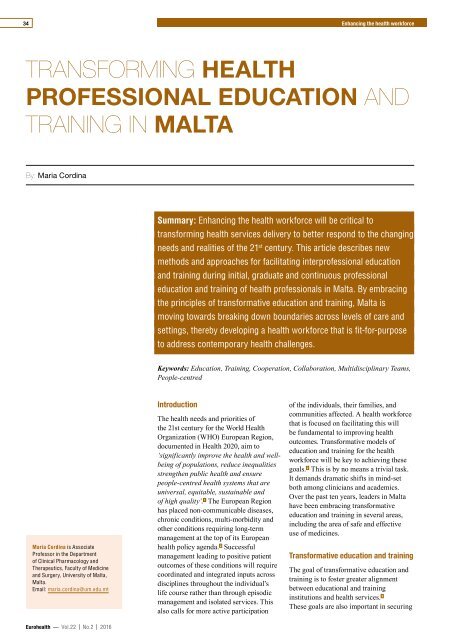EUROHEALTH
Eurohealth-volume22-number2-2016
Eurohealth-volume22-number2-2016
You also want an ePaper? Increase the reach of your titles
YUMPU automatically turns print PDFs into web optimized ePapers that Google loves.
34<br />
Enhancing the health workforce<br />
TRANSFORMING HEALTH<br />
PROFESSIONAL EDUCATION AND<br />
TRAINING IN MALTA<br />
By: Maria Cordina<br />
Summary: Enhancing the health workforce will be critical to<br />
transforming health services delivery to better respond to the changing<br />
needs and realities of the 21 st century. This article describes new<br />
methods and approaches for facilitating interprofessional education<br />
and training during initial, graduate and continuous professional<br />
education and training of health professionals in Malta. By embracing<br />
the principles of transformative education and training, Malta is<br />
moving towards breaking down boundaries across levels of care and<br />
settings, thereby developing a health workforce that is fit-for-purpose<br />
to address contemporary health challenges.<br />
Keywords: Education, Training, Cooperation, Collaboration, Multidisciplinary Teams,<br />
People-centred<br />
Maria Cordina is Associate<br />
Professor in the Department<br />
of Clinical Pharmacology and<br />
Therapeutics, Faculty of Medicine<br />
and Surgery, University of Malta,<br />
Malta.<br />
Email: maria.cordina@um.edu.mt<br />
Introduction<br />
The health needs and priorities of<br />
the 21st century for the World Health<br />
Organization (WHO) European Region,<br />
documented in Health 2020, aim to<br />
‘significantly improve the health and wellbeing<br />
of populations, reduce inequalities<br />
strengthen public health and ensure<br />
people-centred health systems that are<br />
universal, equitable, sustainable and<br />
of high quality’. 1 The European Region<br />
has placed non-communicable diseases,<br />
chronic conditions, multi-morbidity and<br />
other conditions requiring long-term<br />
management at the top of its European<br />
health policy agenda. 2 Successful<br />
management leading to positive patient<br />
outcomes of these conditions will require<br />
coordinated and integrated inputs across<br />
disciplines throughout the individual’s<br />
life course rather than through episodic<br />
management and isolated services. This<br />
also calls for more active participation<br />
of the individuals, their families, and<br />
communities affected. A health workforce<br />
that is focused on facilitating this will<br />
be fundamental to improving health<br />
outcomes. Transformative models of<br />
education and training for the health<br />
workforce will be key to achieving these<br />
goals. 2 This is by no means a trivial task.<br />
It demands dramatic shifts in mind-set<br />
both among clinicians and academics.<br />
Over the past ten years, leaders in Malta<br />
have been embracing transformative<br />
education and training in several areas,<br />
including the area of safe and effective<br />
use of medicines.<br />
Transformative education and training<br />
The goal of transformative education and<br />
training is to foster greater alignment<br />
between educational and training<br />
institutions and health services. 3<br />
These goals are also important in securing<br />
Eurohealth — Vol.22 | No.2 | 2016
















